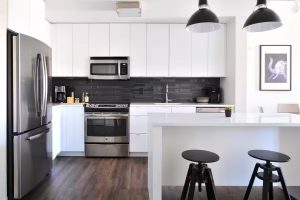Renovating your kitchen can be an exciting yet daunting endeavour, especially in a vibrant market like Vancouver, BC. With the potential to enhance both the functionality and aesthetic appeal of your home, a kitchen remodel can significantly impact your lifestyle and property value. However, understanding the financial implications — particularly the kitchen renovation cost — is crucial before embarking on this journey.
Before You Renovate: Know the Costs
When considering a kitchen renovation, the first step is to grasp the overall costs involved. The cost of remodeling a kitchen can vary widely based on factors like project scope, materials, and labour. On average, homeowners in Vancouver can expect to spend between $30,000 and $100,000 for a complete kitchen remodel, depending on the complexity and quality of the work.
To better understand where your money will go, it’s essential to break down the costs into specific categories:
- Cabinetry: This is often the most significant expense in a kitchen remodel, accounting for approximately 30% of the total budget. Custom cabinets can range from $10,000 to $25,000, while stock options may be more budget-friendly.
- Countertops: The choice of material greatly influences the cost. Options like granite or quartz can range from $3,000 to $8,000, depending on the size and complexity of the installation.
- Appliances: Upgrading to energy-efficient models can cost between $5,000 and $15,000 for a complete suite, including a refrigerator, stove, and dishwasher.
- Labour: Skilled labour in Vancouver can be pricey, often consuming 20% to 35% of your total budget. Hiring experienced contractors is crucial for ensuring quality work.
- Miscellaneous Costs: Don’t forget to account for permits, design fees, and unexpected expenses, which can add 10% to 20% to your overall budget.

Hidden Fees to Watch Out For
While planning your renovation, it’s vital to be aware of potential hidden fees that can inflate your budget unexpectedly and impact the total kitchen renovation cost. Here are some common pitfalls to avoid:
- Permit Costs
Depending on the scope of your renovation, you may need to obtain permits from your local municipality. These fees can vary significantly based on the type of work being done, such as moving walls or altering plumbing and electrical systems. Always check with your contractor to ensure all necessary permits are secured. - Structural Changes
If your renovation involves significant structural changes, such as removing walls or relocating plumbing, the costs can escalate quickly. Structural modifications often require additional engineering assessments and may lead to unforeseen expenses if issues arise during construction. - Design Fees
Hiring a professional designer can enhance the functionality and aesthetics of your kitchen, but it also adds to your costs. Designers typically charge a flat fee or a percentage of the total project cost. While their expertise can be invaluable, it’s essential to factor this into your budget from the outset. - Unexpected Repairs
Older homes may present hidden issues, such as outdated wiring or plumbing problems, that can surface during renovations. Setting aside a contingency fund of 10% to 20% of your total budget can help cover these unexpected repairs.
Smart Savings Strategies
When it comes to kitchen renovations, smart savings strategies can significantly reduce your overall costs, allowing you to maximize your budget without sacrificing quality. One effective approach is to prioritize your spending by focusing on key areas that will have the most impact. For instance, investing in high-quality cabinets and countertops can enhance both the functionality and aesthetics of your kitchen, providing a substantial return on investment.
Consider mixing high-end finishes with more affordable options to balance the budget. For example, you might choose a luxurious countertop paired with budget-friendly cabinets that still offer a stylish look. Additionally, reusing or refurbishing existing elements, like cabinetry or appliances, can also cut costs. A fresh coat of paint or new hardware can transform old cabinets, giving them a modern update without the expense of a full replacement.
Another savvy strategy is to time your purchases to coincide with sales or discounts. Many retailers offer significant savings during holiday promotions or end-of-season clearances. By planning your renovation timeline accordingly, you can take advantage of these deals and stretch your budget further. Remember, a well-executed kitchen remodel doesn’t always require a large investment; it’s about making informed decisions and finding creative ways to reduce your kitchen renovation cost.

The Importance of Budgeting
Creating a comprehensive budget is a vital step in ensuring a successful kitchen renovation. A well-planned budget acts as a roadmap, guiding you through the renovation process and helping you make informed decisions. It sets clear boundaries on spending and prevents financial overcommitment, allowing you to focus on achieving your renovation goals.
Begin by listing all potential expenses, categorizing them into essential and non-essential items. Essential expenses include structural changes, plumbing, and electrical work, while non-essential items might encompass luxury finishes or high-end appliances. This distinction helps prioritize spending and ensures that critical aspects of the renovation are covered first.
Regularly reviewing and updating your budget throughout the renovation process is crucial. As unexpected expenses arise, adjust your budget accordingly to accommodate these changes. By maintaining a close eye on your finances, you can avoid overspending and ensure that your kitchen renovation remains on track, both financially and in terms of timeline.
The Role of Contractors
Choosing the right contractor is pivotal in ensuring a smooth and successful kitchen renovation. Contractors bring expertise, experience, and resources to the table, significantly impacting the overall quality and efficiency of the project. When selecting a contractor, look for someone with a proven track record, excellent references, and relevant experience in kitchen renovations.
Before hiring a contractor, obtain multiple quotes to compare costs and services. A detailed quote should itemize all expenses, including labour, materials, and any additional fees. This transparency helps you understand where your money is going and allows you to make informed decisions. Ensure the contractor is licensed, insured, and bonded to protect yourself from any liabilities during the renovation.
Effective communication with your contractor is key to a successful partnership. Clearly convey your vision, expectations, and budget constraints from the outset. Regular check-ins and updates will keep you informed of progress and help address any concerns promptly. By establishing a strong working relationship, you can ensure that your renovation proceeds smoothly and achieves the desired results.

Maximizing Your Investment
Maximizing your investment in a kitchen renovation involves making strategic decisions that enhance both the functionality and value of your home. A well-designed kitchen not only improves daily living but also increases the resale value of your property. To achieve this, focus on timeless design elements that appeal to a broad range of potential buyers and help justify the kitchen renovation cost.
One way to maximize your investment is by incorporating energy-efficient appliances and fixtures. These not only reduce utility bills but also appeal to environmentally conscious buyers. Additionally, ensuring ample storage solutions can enhance the kitchen’s functionality, making it more attractive to potential buyers. Consider innovative solutions like pull-out pantry shelves, built-in organizers, and under-cabinet lighting to add both convenience and appeal. For smaller spaces, applying small kitchen renovation ideas such as maximizing vertical storage and using space-saving appliances can make a big difference in both usability and value without a high kitchen renovation cost.
Furthermore, paying attention to the kitchen layout is crucial. An efficient layout enhances workflow and usability, making the space more enjoyable to use. Popular layouts such as the L-shape, U-shape, or open-plan designs offer flexibility and cater to various needs. By carefully considering these elements, you can create a kitchen that stands out and provides a strong return on your investment.
Summary
Renovating your kitchen in Vancouver can be a rewarding experience, but it’s essential to approach it with a clear understanding of the costs involved. By being aware of hidden fees, employing smart savings strategies, and working with reputable contractors, you can achieve your dream kitchen while staying within budget. Remember, a well-planned renovation not only enhances your living space but also adds value to your home, making it a worthwhile investment for years to come.
